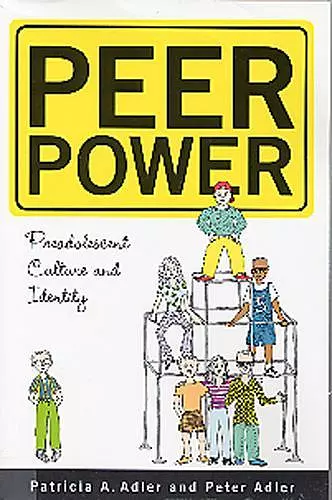Peer Power
Preadolescent Culture and Identity
Peter Adler author Patricia Adler author
Format:Paperback
Publisher:Rutgers University Press
Published:1st Jan '98
Currently unavailable, and unfortunately no date known when it will be back

Peer Power seeks to explode existing myths about children's friendships, power and popularity, and the gender chasm between elementary school boys and girls. Based on eight years of intensive insider participant observation in their own children's community, Peter and Patti Adler discuss the vital components of the lives of preadolescents, popularity, friendships, cliques, social status, social isolation, loyalty, bullying, boy-girl relationships, and afterschool activities. They describe how friendships shift and change, how people are drawn into groups and excluded from them, how clique leaders maintain their power and popularity, and how individuals' social experiences and feelings about themselves differ from the top of the pecking order to the bottom. In so doing, the Adlers focus their attention on the peer culture of the children themselves and the way this culture extracts and modifies elements from adult culture. Children's peer culture, as it is nourished in those spaces where grown ups cannot penetrate, stands between individual children and the larger adult society. As such, it is a mediator and shaper, influencing the way children collectively interpret their surroundings and deal with the common problems they face.
The Adlers explore some of the patterns that develop in this social space, noting both the differences in boys' and girls' gendered cultures and the overlap in many social dynamics, afterschool activities, role behaviour, romantic inclinations and social stratification. For example, children's participation in adult-organized afterschool activities - a now-prominent feature of many American children's social experience - has profound implications for their socialization and development, moving them away from the negotiated, spontaneous character of play into the formal systems of adult norms and values at ever-younger ages. When they retreat from adults, however, they still display distinctive peer group dynamics, forging strong ingroup/outgroup differentiation, loyalty and identification. Peer culture thus contains informal social mechanisms through which children create their social order, determine their place and identity, and develop positive and negative feelings about themselves. Studying children's peer culture is thus valuable as it reveals not only how this subculture parallels the adult world but also how it differs from it.
An excellent addition to a growing number of rich empirical studies of children's lives and peer cultures. The Adlers' study demonstrates the importance of entering children's worlds and gaining their perspectives for a new sociology of childhood. -- William A. Corsaro * Indiana University *
An in-depth and often sobering amount of the social dynamics of childhood in the 1990s. This important study extends our knowledge of peer culture beyond the walls of classrooms into the day-to-day dilemmas of middle-class children as they seek power and acceptance from their peers. -- Donna Eder * author of School Talk *
An engaging, fascinating, and important book. -- Spencer Cahill * University of South Florida *
ISBN: 9780813524603
Dimensions: 229mm x 152mm x 20mm
Weight: 425g
272 pages